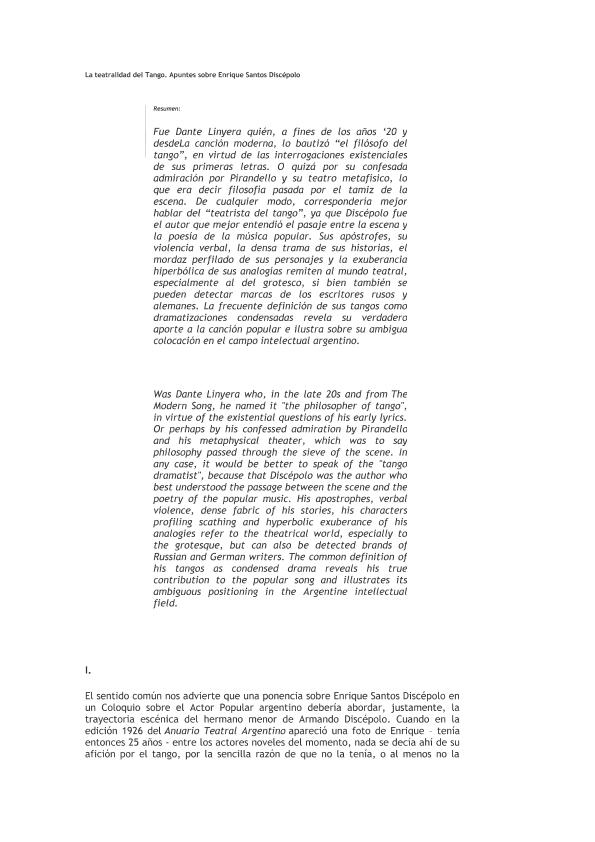Artículo
Fue Dante Linyera quién, a fines de los años ‘20 y desdeLa canción moderna, lo bautizó “el filósofo del tango”, en virtud de las interrogaciones existenciales de sus primeras letras. O quizá por su confesada admiración por Pirandello y su teatro metafísico, lo que era decir filosofía pasada por el tamiz de la escena. De cualquier modo, correspondería mejor hablar del “teatrista del tango”, ya que Discépolo fue el autor que mejor entendió el pasaje entre la escena y la poesía de la música popular. Sus apóstrofes, su violencia verbal, la densa trama de sus historias, el mordaz perfilado de sus personajes y la exuberancia hiperbólica de sus analogías remiten al mundo teatral, especialmente al del grotesco, si bien también se pueden detectar marcas de los escritores rusos y alemanes. La frecuente definición de sus tangos como dramatizaciones condensadas revela su verdadero aporte a la canción popular e ilustra sobre su ambigua colocación en el campo intelectual argentino. Was Dante Linyera who, in the late 20s and from The Modern Song, he named it "the philosopher of tango", in virtue of the existential questions of his early lyrics. Or perhaps by his confessed admiration by Pirandello and his metaphysical theater, which was to say philosophy passed through the sieve of the scene. In any case, it would be better to speak of the "tango dramatist", because that Discépolo was the author who best understood the passage between the scene and the poetry of the popular music. His apostrophes, verbal violence, dense fabric of his stories, his characters profiling scathing and hyperbolic exuberance of his analogies refer to the theatrical world, especially to the grotesque, but can also be detected brands of Russian and German writers. The common definition of his tangos as condensed drama reveals his true contribution to the popular song and illustrates its ambiguous positioning in the Argentine intellectual field.
La teatralidad del tango. Apuntes sobre Enrique Santos Discépolo
Fecha de publicación:
12/2014
Editorial:
L. Verzero; Y. A. Leonardi
Revista:
Afuera
ISSN:
1850-6267
Idioma:
Español
Tipo de recurso:
Artículo publicado
Clasificación temática:
Resumen
Archivos asociados
Licencia
Identificadores
Colecciones
Articulos(CCT - LA PLATA)
Articulos de CTRO.CIENTIFICO TECNOL.CONICET - LA PLATA
Articulos de CTRO.CIENTIFICO TECNOL.CONICET - LA PLATA
Citación
Pujol, Sergio Alejandro; La teatralidad del tango. Apuntes sobre Enrique Santos Discépolo; L. Verzero; Y. A. Leonardi; Afuera; X; 14; 12-2014
Compartir




